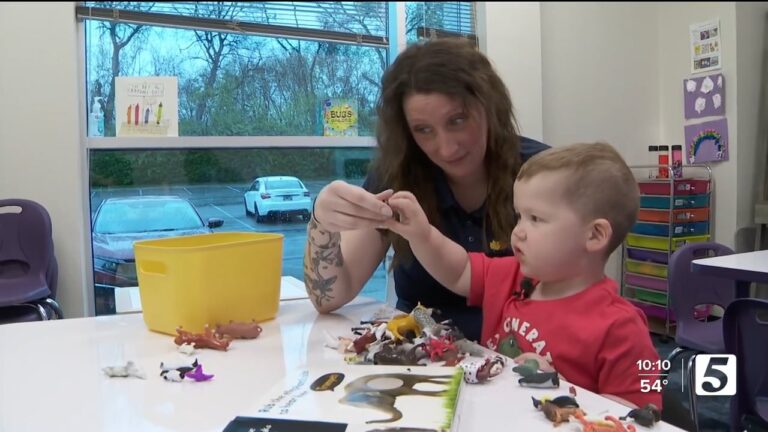How Accurate Is Virtual Testing for Autism?
Traditionally,
diagnosing autism involves multiple visits to a specialist who conducts comprehensive evaluations through in-person assessments. However, in today’s rapidly evolving digital age, remote testing for ASD emerges as a revolutionary diagnostic option for caregivers, ASD professionals, and medical professionals.
Virtual testing for autism can be beneficial for many who may face difficulties accessing an ASD diagnosis by creating new avenues for diagnostic support that may have previously been unavailable.
However, as this newer approach to ASD testing advances and is utilized more often, some questions arise, including: How accurate is virtual testing for autism?
Studies show that remote assessments for autism can be highly accurate in comparison with in-person evaluations, provided that qualified professionals conduct these virtual assessments using reliable tools.
This blog post by ABA Centers of Tennessee explores the concept of remote testing for autism, highlighting its relevance and benefits. We will also compare remote testing to the more traditional in-clinic approach to autism evaluations.
By the end of this article, we hope those considering virtual autism testing will have a much clearer understanding of what the process involves so they can choose the best approach for them.
For more information about
ABA Centers of Tennessee,
click here. To read our other blogs and resources,
visit us here.
Understanding Autism Spectrum Disorder
What Is ASD?
According to
Autism Speaks, autism is a developmental condition that affects communication,
behavior, and social interaction. The symptoms and behaviors associated with ASD vary widely, impacting each person to different degrees.
This variation in experiences is why the term “spectrum” more fully describes the condition and its impact on those it affects.
Importance of Early Diagnosis for Autism
Early diagnosis of ASD is crucial for several reasons. First, it allows for quicker access to interventions like ABA therapy, which insurance often covers for young people with autism. This therapy can significantly improve a neurodivergent child’s overall development and quality of life.
Second, early diagnosis of autism helps parents and caregivers better understand their child’s needs now and seek appropriate ASD support and resources for better future outcomes.
Remote Autism Testing vs. Traditional Autism Testing
In most cases, traditional in-person autism testing involves visiting a clinic where a professional assesses the child through various tests and observations. In contrast, remote ASD testing utilizes technology via a secure portal on your computer or device to conduct the testing.
During this time, the professionals conduct ASD assessments digitally from the comfort of the child’s home. Both methods have their pros and cons, which families should consider.
Pros and Cons
Remote testing offers several advantages over traditional methods, including increased accessibility, reduced stress, and time efficiency. However, some may argue that in-person evaluations provide a more comprehensive assessment.
It’s essential caregivers of ASD children weigh these factors when choosing the right approach for your child.
9 Reasons To Consider for Virtual Autism Testing
The following are some considerations caregivers should keep in mind as they research virtual autism testing.
1. Accessibility
Remote testing eliminates physical barriers to diagnosis, allowing families to access formal ASD evaluations regardless of their location. This accessibility is particularly beneficial for those who need ASD testing in rural or underserved areas.
2. Comfort
Children often feel more at ease in their home environment. Conducting remote ASD assessments can reduce anxiety and stress to improve the testing process for everyone.
3. Reduced Waiting Time
Virtual autism diagnostics options offer quicker access to assessments, bypassing long wait times commonly associated with in-person clinics. This faster turnaround is crucial for early diagnosis and intervention.
5. Time and Cost Efficiency
Remote evaluations reduce travel costs, require families to take less time off work, and lessen childcare needs for siblings, making the diagnostic process more manageable and efficient.
6. Flexibility in Scheduling
Virtual assessments offer more flexibility in scheduling, offering families the ability to choose appointment times that fit their schedules. This adaptability is especially helpful for busy families with many obligations.
7. Access to Specialists
For those living far from specialized autism services, virtual diagnosis allows them to consult with top experts in the field. Geography no longer limits the quality of care their child or teen on the spectrum may receive.
8. Lower Risk of Health Exposure
During times of heightened health concerns, such as flu season or global pandemics, virtual sessions help reduce the risk of illness exposure for families needing an ASD diagnostic test.
This option is especially significant for individuals or families with health vulnerabilities as well.
9. Personalized Support
Remote testing allows for tailored interactions, enabling ASD clinicians to engage with the child in ways that meet them on their level. This personalized approach can produce more accurate and meaningful ASD assessments.
How Virtual Autism Diagnosis Can Improve ASD Testing Accuracy
Virtual testing for autism improves the accuracy of the evaluation process in several ways.
Increased Naturalistic Observations: Remote testing allows ASD clinicians to observe the child in their home environment. This natural context can lead to more accurate assessments of the child’s natural behaviors, daily interactions, and habits to improve testing results.
Less Social Pressure: Children with ASD may experience anxiety during face-to-face interactions, especially with unfamiliar individuals like medical doctors in new settings.
With the professional on screen, the child may experience less social pressure, which may improve their ability to take the test and the accuracy of results.
Reduced Sensory Overloads: Clinical settings can be highly stimulating due to bright lights, noises, and new smells. Virtual evaluations allow the child to remain in a sensory-friendly space they already understand.
Because the child has established expectations, there is less potential for sensory overload and the extreme reactions it may cause during in-clinic autism testing, which improves the accuracy of ASD tests virtually for many.
More Parental Involvement: Parents are vital in providing information about their child’s developmental history, behaviors, and concerns. Virtual evaluations allow parents to participate actively in the assessment process, leading to more comprehensive and accurate results in many cases.
Access to Specialized Tools: Virtual evaluations often use specialized tools. These advanced tools can provide testing professionals additional insights into the child’s behaviors and aid diagnostic accuracy that standard testing cannot.
Timing: Caregivers can schedule their virtual evaluations at a time that best suits their child’s natural rhythms and behavior patterns, potentially leading to more comprehensive observations when the child is in their everyday routine.
How ABA Therapy Can Help After Autism Testing
Once your child has received an autism diagnosis, the next step is to develop a tailored treatment plan.
Applied Behavior Analysis (ABA) therapy is one of the leading evidence-based therapy models for symptom management in individuals with ASD. It focuses on teaching positive behaviors and redirecting and reducing challenging behaviors through structured techniques and positive reinforcement.
ABA therapy can help individuals with ASD in various ways, including:
- Improving Communication Skills: ABA providers work closely with children to help them develop their communication skills. These skills may include but are not limited to various communication needs, such as making requests or engaging in conversation.
- Teaching Daily Living Skills: ABA therapy can also focus on teaching essential daily living skills, such as personal hygiene and self-care.
- Modify Behavior: Over time, ABA can help those who receive it manage their behaviors and experience better outcomes.
Virtual Autism Testing May Be the Path toward Better Access to ABA
Virtual testing for autism is a powerful tool that offers numerous benefits for families, ASD providers, and other professionals working in this field. By providing accessible, accurate, and comfortable assessments, remote testing for autism is changing the way we diagnose and support children with the condition in more inclusive ways.
This new format also offers families better means of timely support, like ABA, which can be genuinely life-changing for many.
So, keep researching and choose the best diagnostic option for you.
Learn More about Virtual Autism Testing with ABA Centers of Tennessee
ABA Centers of Tennessee offers comprehensive virtual ASD evaluation services alongside in-clinic autism testing options. Our team of expert ASD clinicians ensures accurate ASD assessments for every family we serve.
If your loved one has the condition, we design personalized ABA care plans that meet their needs and more.
By choosing ABA Centers of Tennessee, you gain access to supportive ASD services, including in-home ABA, autism diagnostic testing options that work best for your family, and parent training options.
All these resources more actively set your neurodiverse family up for a future where they can successfully achieve their long-term goals and live life on their terms.
Contact us at
ABA Centers of Tennessee today to learn more about how we serve the autism community in Franklin and Goodlettsville. You can reach us via this
online link or by calling (844) 423-9483.
Together, we can pave the way for a brighter future for children with ASD.






